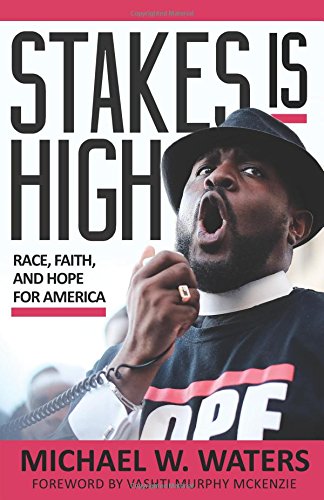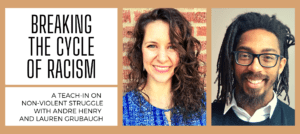
Editor’s Note: This article is the first of two installments. Part two will be published on June 30th.
Another hashtag was created tonight for someone who died at the hands of state-sanctioned violence. I don’t want to date this review by including the name, and by the time you read this, the hashtag memorial will probably have been replaced by another…and possibly more than one. We live in a time where police are afraid of citizens, citizens are scared of police officers, neighbors are scared of neighbors…and the violence continues.
It’s understandable why people are in search of answers. Okay, I see a problem. NOW…HOW DO WE FIX IT? When I get that question in our Racial Justice Institute or anytime I am speaking on issues of justice, I pause and answer with a mix of what the person wants to hear (practical “solutions”) and a sketch of the reality of the real, messy, hard work that lies ahead of anyone interested in working to tumble systems of oppression.
I always tell people to read—I tell everyone to read authors they wouldn’t normally read. I tell people to go home and look on their shelves, or pull up a mental picture of their book collection, and see how many authors of a different race, religion, gender or ethnicity are on those shelves. If you see a pretty striking pattern*—a pattern of all or nearly all white (and usually male) authors—change that. Culturally and subconsciously we place white men in a position of being knowledge bearers and wordsmiths. And they have more support as authors with most publishers. So breaking the hold of those biases and systems only happens by intention.
I tell people: read only women authors for 6 months; read only women of color for a year; pick out your next book with a commitment to find someone who was not born in the United States. And, I say, pick books that aren’t about race—at least some of them. If the only time you are reading books by people of color is when you need a race expert, that’s a problem. We do write about gardening, history, relationships…all kinds of things!
If the only time you are reading books by people of color is when you need a race expert, that’s a problem.
Of course, I also want to encourage people to read the many wonderful books out there about race that are written by people of color. What I also want to invite people to do, especially by reading books that aren’t particularly about race, is to see the humanity in the “other”—literally the other—someone so different that they seem like an other type of being.
And then there are books like Stakes is High by Michael W. Waters, that focus on race in relationship to people of faith and communicates the humanity of people and communities often reduced to a hashtag or a scrolling news story.
Stakes is High isn’t a how-to-end-racism manual. It is a collection of essays, most of them previously shared on the internet as real-time responses to tragedies and top news stories. As you will see next week in Part Two of this series—my conversation with Waters—he wasn’t just reflecting on names and news happening to people in far-away states. As a long-time pastor and activist in Dallas, TX, Waters has lived with a city long grappling with the dangerous intersections of race, systemic injustice, poverty and historic pain inflicted on those with less power and privilege by those with more. This isn’t just a theoretical issue for Waters and his congregation—this is a life-and-death reality.
I found myself making notes throughout—remembering certain cases and names, my memory jogged as something tied itself to another historical moment. Each chapter is short and written in an accessible, easy-to-understand manner even though Waters himself is multi-degreed with a doctoral degree from Southern Methodist University. Waters is a translator who weaves several strands together in this book: storytelling, theologizing, personal reflection and historical context. He even explains the title in the introduction, so those worrying if they can trust a book with “bad” grammar in the title can quickly see the link to the hip-hop lyric from which the phrase is taken.
Lastly, there is a free companion guide available on Waters’ website, which was designed by a team of pastors and Christian education experts. I think this book would make an excellent choice for a Sunday school book club or even a high school youth group—however, you may need to make adjustments to some of the discussion questions. The companion book has a more academic feel for many of the discussion questions it provides, and may need to be adjusted if most of the people in the group haven’t had academic theological training.
Stakes is High will spark discussion about race and current events in a challenging yet personal way.
If you are considering what to do for a fall or winter book club, or even a late summer read—Stakes is High would be well worth the read. It is reasonably priced (under $15), the theology is solid (it is a project of the Forum for Theological Exploration) and it will spark discussion about race and current events in a challenging yet personal way.
In the next part of this series, you will get to peek into a conversation I had with Waters as we discussed the book, his work in Dallas and what it’s like to walk with families and community members dealing with daily oppressions punctuated by systematically perpetrated violence.
Micky ScottBey Jones—the Justice Doula—is a womanist contemplative activist, healer, nonviolent direct action organizer and consultant who facilitates conferences, workshops, pilgrimages, retreats and online conversations. She writes and speaks on a variety of topics including healing justice, communal self-care, contemplative activism, intersectionality and theology from the margins. Micky has an M.A. in Intercultural Studies and is an Associate Fellow of Racial Justice with Christians for Social Action. She is the Director of Healing Justice at Faith Matters Network based in Nashville, TN. Micky was named one of the Black Christian leaders changing the world in Huffington Post. You can interact with her work and collaborations at MickyScottBeyJones.com.
*This pattern is often different, but not always, for people of color (POC) who have books by people that look like them, and people that don’t. I encourage people of any kind to examine what kind of diversity is missing from their bookshelves and challenge themselves accordingly in future purchasing and borrowing.


